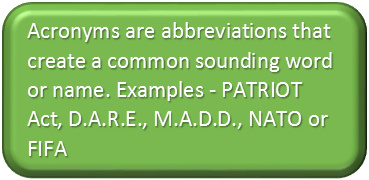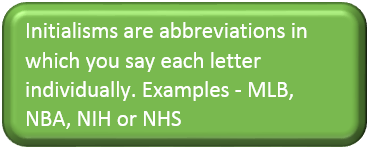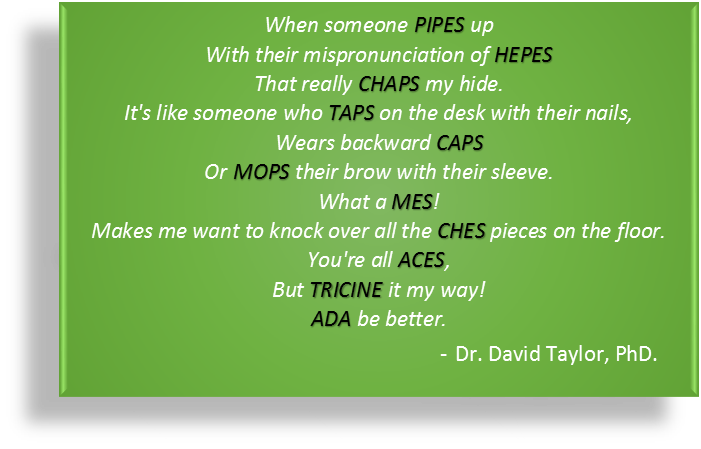It is an inherently human trait to look for patterns in objects or things that we can personalize or make familiar. We do it with everything that is strange to us, in order to make it feel less strange. Our ancestors did it with stars they saw in the ancient night sky and our children (and some grown-ups like me) still do so with clouds on lazy summer afternoons.

We also do it with words. Acronyms and initialisms are a huge part of our daily lives when titles or names get too long to bother saying all the time; from government agencies who use initialisms like FBI and acronyms like NASA to common associations like AARP or D.A.R.E.
Many times, the choice between the use of an acronym or an initialism is made for us, and we all quickly fall in line behind the originator of the term. By making a pattern of the abbreviations of these names, we make them less strange for our tongues to say and less strange for our ears to hear. And creating a perfect abbreviation is truly an art form, both in terms of gaining support, as well as the instant recognition factor, although many of the ones we think of as extremely clever are actually “backronyms;” when names are created to fit a preexisting acronym instead of the name existing first (think “SHIELD” from the Marvel movies - Strategic Homeland Intervention, Enforcement and Logistics Division).

In science, we use initials all the time when referring to chemicals and reagents. Common initialisms reverberate through the lab with names like dH2O, NaOH, BME, DTT, IPTG or YEPD (Yeast Extract Peptone Dextrose). And there are even more reagents that we regularly use which have developed into bonafide acronyms over the years for easier pronunciation, such as TEMED (Tetramethylethylenediamine), MUG (4-Methylumbelliferyl beta-D-glucuronide), TCEP (Tris (2-Carboxyethyl) phosphine) or FITC (Fluorescein-5-isothiocyanate).
But what about all those reagents that you just don’t know how to say? We all use buffers nearly every day in the lab.And while there are often lab traditions, passed down from PI to PI, on how to pronounce a buffer’s name this way or that. But we have all suffered the embarrassment of mispronouncing a “common” name in front of colleagues and being “educated” in the correct pronunciation by the token know-it-all of the group. Dr. Norman Good gave us a huge number of buffers, and to each one, he prescribed a “trivial name”.
And while I’m sure that Dr. Good had a preferred way of saying these names, he unfortunately did not leave his established pronunciation guide for how he spoke them personally, whether he used them as initialisms or whether he created acronyms out of the abbreviations.
But for all the confused researchers and grad students out there, GoldBio is here to help put an end to the grab-bag of buffer names. As we have a large number of Good’s buffers in stock, we’d like to take a moment to settle the questions once and for all as how to pronounce our buffers so that you can say their names with confidence and authority with the GoldBio seal of approval.
GoldBio Buffers (pronunciation guide via Merriam Webster):
| Buffer | Name Type | Pronunciation | Rhymes with |
| ACES | Acronym | ā’ ses | “bases” or “vases” |
| ADA | Initialism |
|
|
| BES | Initialism |
|
|
| Bicine | Acronym | bī’ sēn | “my scene” |
| CAPS | Acronym | caps | “flaps” or “maps” |
| CHES | Acronym | ches | “press” or “less” |
| HEPES | Acronym | hep’ ēz | “step please” |
| HEPPSO | Acronym | hep’ sō | “step low” |
| MES | Initialism |
|
|
| MOPS | Acronym | mäps | “hops” |
| MOPSO | Acronym | mäp’ sō | “hop no” |
| PIPES | Acronym | pīps | “hypes” or “types” |
| TAPS | Acronym | taps | “flaps” or “maps” |
| TES | Initialism |
|
|
| Tricine | Acronym | trī’ sēn | “my scene” |
And now you know! By the way, I only included our buffers that are obvious acronyms and initialisms. If you would like to know the proper pronunciation of other reagent abbreviations, leave a note in the comment section and we’ll get back to you!

Category Code: 88253 7910 79108 79107






